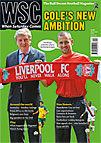 As more Northern Irish fans look to England and Scotland for their football, Robbie Meredith stikes up for the financially challenged local game
As more Northern Irish fans look to England and Scotland for their football, Robbie Meredith stikes up for the financially challenged local game
Like their lower-division counterparts across the water, supporters in Northern Ireland will have mixed views on England’s summer struggles in South Africa. There’s always the hope that widespread disillusion with brand Wazza, Lamps and JT will lead more people to abandon the Premier League chimera and venture to their nearest club. Yet most local fans also fear that within a couple of “Super Sundays”, many potential supporters will be booking flights and tickets for Anfield and Old Trafford rather than trekking a mile or two to Seaview or Solitude.
The IFA seems to exist in a permanent state of crisis. The botched departure of the former chief executive Howard Wells cost the association over half a million pounds in settlement and legal fees, and prompted a damning government report. This should have led to the resignation of the IFA’s uninspiring chairman Raymond Kennedy, who ignored the advice of the association’s own solicitors when sacking Wells. Having initially agreed to quit, Kennedy is now having second thoughts, to the displeasure of the sports minister Nelson McCausland. He is threatening to withhold millions of pounds of funding to local football, as he doesn’t trust the IFA to spend it wisely under Kennedy’s leadership.
More public money is vital for local clubs, many of whom are living in fear of the bank manager and the taxman, and would enable essential improvements in stadium facilities and safety. More positively, many teams are now facing up to their own financial responsibilities. While Glentoran are currently in trouble, the board, which includes two members of the supporters’ trust, have announced a more realistic wage structure in an attempt to end some of the more exorbitant pay packets handed out to players in recent years.
For many people Irish league football is synonymous only with bad news, which is frustrating as there are many good things about the local game. In the past month, the part-timers of Portadown and Cliftonville both triumphed over full-time eastern European sides in Europa League qualifiers. Cliftonville manager Eddie Patterson even had to appeal to employers to allow some of his players time off work to travel to the away leg, not a situation that Harry Redknapp or Roberto Mancini will have much experience of. Linfield, meanwhile, put up a creditable performance in defeat against perennial Champions League qualifiers Rosenborg.
It’s probably too much to hope that these results will nail the myth, often spread by those who have never set foot inside a local ground, that Irish league football is just kick and rush. Yes, some games are agricultural rubbish, but that’s the case in any league in the world. Despite Gerry Armstrong’s rather erratic punditry, Sky’s unlikely live coverage of a sprinkling of local games in recent seasons should have convinced the armchair army that some teams here can produce genuinely thrilling contests.
Additionally, a number of teams enter the new season hoping to challenge for the Gibson Cup. If only the authorities would scrap some of the minor, and often meaningless, midweek cups which have to compete for an audience with Champions League games, then more supporters might be drawn to a genuine title race. Linfield will be favourites again but, despite their off-field problems, Glentoran, under new manager Scott Young, will expect to run them close. North Belfast rivals Cliftonville and Crusaders also look in good shape, while Portadown, managed by the comically gruff Ronnie McFall, are recovering momentum after a few difficult seasons. In a 12-team league there are few easy games, and mid-table sides like Coleraine, Glenavon and Ballymena United might also challenge for European football.
Finally, there’s also genuine identification between supporters and players here. Many work, mix and socialise together, and a number of footballers spend most of their careers with one club. The most outstanding example is Linfield’s captain Noel Bailie, who has played over 1,000 games for the club. Commitment like that deserves more of an audience. Unfortunately, it’s unlikely to attract those for whom football is a game played only on the other side of the Irish sea.
From WSC 283 September 2010